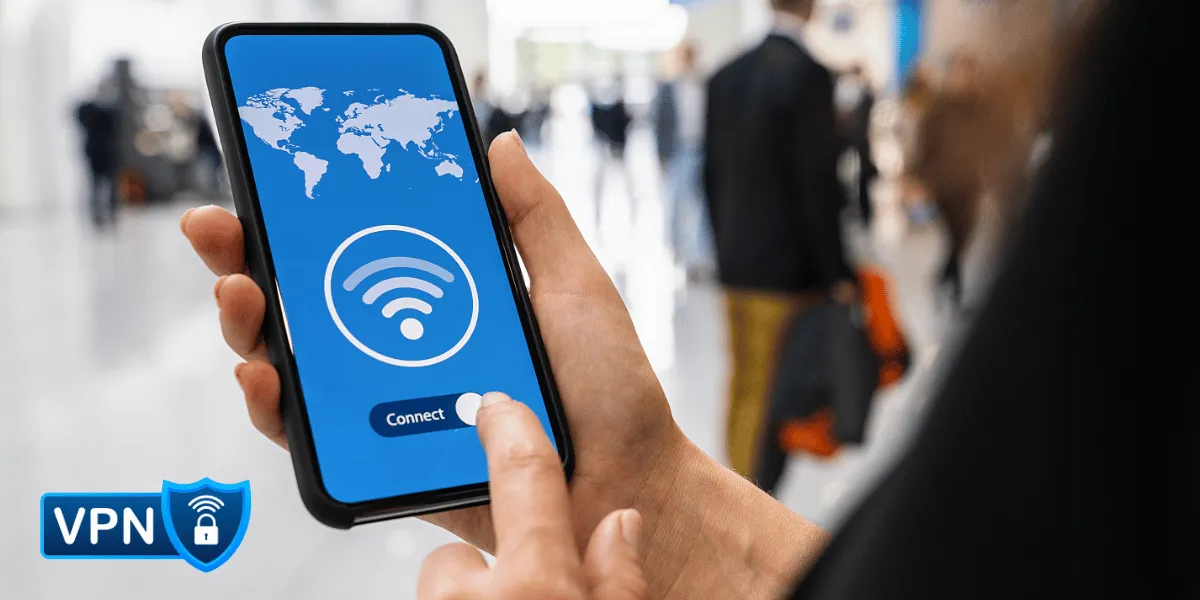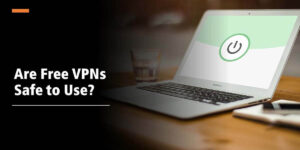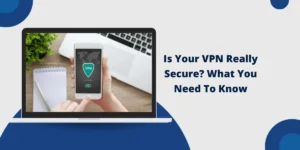How a VPN Can Help You Stay Safe on Public Wi-Fi Networks
Using public Wi-Fi networks can be very convenient when you are on the go. However, public networks also come with risks, as they often need to be more secure than private networks. Anyone else using the same public network potentially has access to the information you are sending over it.
Public Wi-Fi networks are available in many convenient locations, including coffee shops, hotels, airports, libraries, and more. Connecting to public hotspots provides easy internet access for working remotely, streaming entertainment, and staying connected on the go.
However, any time you connect to an open public network that anyone can access, you are potentially exposed to certain cybersecurity risks. Hackers can more easily intercept data and gain access to your device over a public versus private Wi-Fi connection.
While public networks offer great convenience, extra precautions are needed to use them safely. Following cyber safety best practices is important for protecting your personal information and privacy.
Key Takeaways
- Public Wi-Fi networks are convenient but less secure than private networks. Use caution when connecting.
- Enable firewalls, disable sharing, and turn off Wi-Fi auto-connect to reduce risks.
- Use a virtual private network (VPN) to encrypt your internet connection.
- Avoid accessing sensitive accounts or info like banking and credit cards over public networks.
- Use HTTPS websites and avoid plain HTTP when possible.
- Be cautious of “evil twin” fake hotspots mimicking real ones. Verify the network name.
- Avoid risky behaviors like torrenting files or downloading illegal content over public connections.
- Use antivirus software and keep devices updated with the latest security patches.
- Turn off Wi-Fi and disconnect when not actively using a public network.
What is Public Wi-Fi and Why is it Dangerous?
Public Wi-Fi networks refer to open wireless networks available for public use across locations such as cafes, airports, hotels, and libraries. These networks enable convenience as users can access the internet without employing cellular data.
However, public Wi-Fi networks also introduce vulnerabilities due to a typical lack of encryption. Transmitted data is thereby sent in plaintext, allowing skilled attackers to intercept communications and access sensitive information.
Malicious actors frequently exploit these unsecured networks to conduct malicious cyber operations including man-in-the-middle assaults and wireless surveillance. In man-in-the-middle attacks, the assailant intercepts communications between the end-user and accessed websites, facilitating the theft of sensitive data such as credentials, payment details, and personal information. Through wireless surveillance, the assailant captures and monitors user internet traffic, enabling the harvesting of sensitive data absent user knowledge or consent.
Utilizing public Wi-Fi networks devoid of additional safeguards thus poses extreme risks potentially resulting in identity fraud, financial loss, and other malicious harm. Implementing precautions securing your network connection when using public Wi-Fi is essential, with a virtual private network assisting in this objective.
Major Benefits of Using a VPN on Public Wi-Fi Networks
Using a VPN on public Wi-Fi networks offers several benefits, including:
1. Increased Security and Privacy
When interfacing with an unsecured public Wi-Fi network, digital communications are transmitted over an unauthorized connection, exposing the data to malicious hackers and cyber perpetrators. Utilizing a virtual private network (VPN) ensures that internet data is encrypted and transmitted via a secure tunnel, safeguarding confidential information from potential risks. This ensures that even if transmitted packets are intercepted, unauthorized entities will be unable to extract or access the encapsulated data payload.
A VPN also conceals the IP address and network activities from surveillance systems including ISPs and government monitoring agencies. This obfuscates the online persona and thwarts tracking or monitoring of personal information. Additionally, certain VPN solutions incorporate advanced security features such as anti-malware and ad-blocking mechanisms that provide enhanced insulation from cyber-attacks.
2. Access to Restricted Content
Virtual private networks (VPNs) can facilitate circumventing geographical restrictions placed on some websites, online services, and streaming media. By utilizing a VPN, one can alter their internet protocol (IP) address and mask their online activity as originating from a different geographical region.
This enables accessing content as well as services that may be prohibited or limited within one’s actual location. For instance, if streaming a particular media service or social media platform has been blocked in one’s country, a VPN can route that traffic through a server in a region where that service remains accessible. One would then be able to utilize said service as if browsing from that alternative location.
VPNs also allow bypassing restrictions due to licensing constraints or copyright laws that may curtail availability of certain content in a particular geography. However, it is important to note that not all VPN services successfully circumvent regional limitations. Some streaming media providers actively implement measures to detect and thwart VPN use.
Selecting a reputable VPN with a large, geographically diverse network of servers as well as a proven ability to surmount geographic blocking is paramount.
3. Protection Against Cyber Threats
The utilization of a virtual private network cryptographic tunnel during transmission of digitized communication packets over public packet switched data networks with open access architecture provides increased security, privacy, and anonymity for connected end nodes.
When a user device connects to such an internet service over open wireless local area networks without authentication, the respective network interface is susceptible to unauthorized eavesdropping, data interception, credential extraction and identity theft attempts by malicious actors within the same network segment.
Through the application of encryption cipher suites and obfuscated routing protocols within the VPN cryptographic overlay, the user’s network traffic is encapsulated and transported over a covert channel, concealing the original data contents and IP addresses from unintended observers. This thwarts exploitation attempts such as sniffing, man-in-the-middle attacks and phishing exploits targeting the connected user node.
Understand the Risks of Using Public Wi-Fi
Public Wi-Fi networks present a few key security vulnerabilities to be aware of:
Lack of Encryption
Unlike private home or office networks, data sent over public Wi-Fi is often unencrypted. This means it is easier for hackers to “eavesdrop” on the network and intercept the data you are transmitting.
Greater Access Points
Public networks have multiple access points across large areas, which provides more potential entryways for hackers. More access expands the attack surface area.
No Password Protection
Public networks are open to anyone. They do not have password protection or other authentication controls to limit access like private networks.
Unsecured Hotspots
Some public networks need to be better configured or have weaknesses that make spoofing or man-in-the-middle attacks easier to carry out.
Fake Networks
Attackers can also set up fraudulent hotspots mimicking the names of legitimate public networks to trick users into connecting. These “evil twin” networks intercept user data.
Being aware of these types of vulnerabilities can help you take the proper precautions when using public Wi-Fi. While you are not immune to security risks, you can take steps to minimize your exposure.
Is Free VPN Safe to Use for Public Wi-Fi Networks?
While numerous gratis virtual private network (VPN) services are available, utilization of them for public Wi-Fi networks is not advisable. Free VPN solutions frequently proffer restrictions such as decreased throughput, limited bandwidth allocation, and fewer server options. Some free VPN services may even record your online activities and sell your data to third-party advertisers, counter to the aim of employing a VPN for privacy and security.
Moreover, certain free VPN offerings have been found compromised by malware or possess security vulnerabilities, capable of threatening your endpoint device and sensitive information. Therefore, selecting a reputable VPN provider that offers robust security features and a proven track record of safeguarding user privacy is imperative.
Though compensated VPNs incur cost, the additional security and privacy they furnish are worthwhile, particularly when safeguarding sensitive data on public Wi-Fi networks. When choosing a VPN, contemplate factors such as encryption protocols, server locations, and user reviews to discern the optimal VPN for your requirements.
Secure Your Device Before Connecting to Public Networks
The first line of defense is securing your device. Be sure to follow these precautions:
- Update software and OS: Before connecting to public networks, Make sure your operating systems, software, apps, and security tools are all up-to-date with the latest patches. Outdated software is more vulnerable.
- Use a firewall: Enable your operating system and security software firewalls to monitor network traffic. This helps prevent unauthorized access.
- Turn off sharing: Disable file and printer sharing, as well as ad hoc network connections on your device. This prevents access to your files and resources over the network.
- Disable Wi-Fi auto-connect : Do not set your device to automatically connect to nearby Wi-Fi. Manually pick networks to avoid unintentionally connecting to unsecured public networks.
- Use encryption: Ensure your hard drive is encrypted in case your device is ever lost or stolen, preventing access to your data.
Use a VPN for Public Browsing and Communication
A virtual private network (VPN) provides a very effective solution for staying safe on public Wi-Fi. A VPN creates an encrypted tunnel between your device and the VPN server, protecting your web traffic and communications from interception and hacking.
Some key benefits of using a VPN over public networks include:
- Encrypts data in transit over the network
- Masks your IP address and location
- Prevents network snooping and eavesdropping
- Secures access to private networks remotely
- Bypasses geographic content restrictions
- It provides anonymity for your browsing and activity
There are many reputable paid and even free VPN providers for enhanced public Wi-Fi security. Look for VPNs that offer robust encryption, such as AES-256 or OpenVPN protocol, for optimal connection protection.
Using a VPN is highly recommended whenever accessing the internet or transmitting sensitive data over any public network. It provides an encrypted tunnel that maintains your privacy.
Use Caution Accessing Accounts and Personal Info
When connected to an open public network, it is best to avoid accessing sensitive accounts or transmitting private data that could put you at risk if intercepted.
Some tips on safely accessing accounts and info include:
- Avoid logging into financial accounts: Do not access online banking, investment accounts, or other financial platforms over public Wi-Fi. The lack of encryption can expose your login details and account numbers.
- Don’t shop online: Be cautious about entering payment card information to shop online over a public connection, as this data could be intercepted. If you do shop online, use a credit card rather than a debit card for better fraud protection.
- Beware public computers: If you access any accounts on a public machine, be sure to fully log out and clear browser data when you are done. Don’t save passwords or allow the device to remember your credentials.
- Use private browsing: When connected to public networks, Enable your browser’s private or incognito browsing. This avoids storing browsing history, cookies, and cached data on the local machine.
- Look for “HTTPS”: When visiting websites over public Wi-Fi, look for “HTTPS” in the URL, which indicates a secure encrypted connection. Avoid “HTTP” sites that do not encrypt data.
How to Configure Your Browser Settings for Enhanced Security
Tweaking your web browser settings is another way to improve your connection security on public networks:
- Disable auto-fill: Turn off auto-fill password and form-saving features so that your credentials are not stored locally on public networks.
- Clear history: Regularly clear your browser history, cookies, and temporary files to avoid leaving trails on devices.
- Expand tracking protection: Enable tracking prevention and anti-fingerprinting features to block unwanted ad trackers.
- Avoid plain text sites : Do not enter any sensitive data on plain HTTP sites on public networks if they do not use HTTPS encryption.
- Disable location sharing: Turn off browser location and GPS permissions so your location is not leaked over an insecure public connection.
- Disable unused extensions: Browser add-ons and extensions can sometimes create vulnerabilities. Disable any that are not actively needed when using public Wi-Fi.
- Pop-up blockers: Enable pop-up blockers to avoid risky or malicious pop-ups that commonly occur on public networks.
Be Wary of “Evil Twin” Wi-Fi Hotspots
One common trick hackers use with public networks is setting up fake Wi-Fi access points that impersonate legitimate hotspots. These malicious networks are referred to as “evil twins.”
Evil twin networks exploit devices’ tendency to automatically connect to remembered network names. For example, if you connect to “Hotel_WiFi” often, an evil twin may appear as “Hotel_WiFi_Backup.”
Here are some tips to avoid evil twin networks:
- Verify the network name: If a known network appears with small variations or extra characters, be suspicious. Visually confirm you are connecting to the exact proper name.
- Use a VPN. A VPN will encrypt your connection even if you accidentally join an evil twin, as hackers will only see encrypted data.
- Check for HTTPS sites: If common sites suddenly show warnings about unverified certificates, you may be on a fake network intercepting data.
- Toggle Wi-Fi on and off: Turn Wi-Fi off for a minute and then back on before connecting to refresh the list of available networks. This helps spot fake networks that may disappear when Wi-Fi is toggled.
- Manually select networks: Avoid auto-connect features and manually select hotspots to ensure you join the correct wireless network.
- Use mobile data: When in doubt, use mobile data instead of public Wi-Fi to avoid inadvertently joining malicious twin networks.
Avoid Risky Behaviors on Public Connections
Certain online behaviors over public Wi-Fi can significantly amplify your risks of hacking, malware, or legal issues. You should avoid:
- Torrenting: Downloading torrents is risky on public networks. Copyright infringement notices could be linked to your device’s IP address.
- P2P file sharing: Peer-to-peer apps may share files publicly from your device: Disable P2P apps when on public networks.
- Unsecured shopping: Do not enter payment information over HTTP sites lacking encryption on public Wi-Fi.
- Suspicious downloads: Be cautious about downloading programs or files from unofficial sites that may contain malware.
- Streaming premium content: Avoid streaming subscription content like movies or TV shows, which could violate user agreements.
- Disabling security tools: Never disable antivirus scanners or firewalls to get around usage restrictions on public networks.
- Accessing illegal content: Viewing illegal or questionable material could be traced back to your device’s public IP address.
Use Antivirus and Firewall Security Tools
Having robust cybersecurity software installed on your device provides another layer of protection when using public networks. Key programs to include:
- Antivirus software: Install antivirus/antimalware tools to scan for and remove malware or viruses that may infiltrate your device over public Wi-Fi.
- Firewalls: Firewalls monitor network traffic and block unauthorized connection attempts or intrusions.
- VPN: As covered earlier, a VPN encrypts all network data to keep it secured from prying eyes.
- Password manager: A password manager generates strong, unique passwords for all your accounts and stores them securely in an encrypted vault.
- Encryption tools: File encryption programs like VeraCrypt allow for the encryption of specific data files for added security.
- Updates: Ensure you promptly install all critical software, security, and operating system updates as they become available.
Disconnect from Public Networks When Not in Use
One final best practice is to disconnect from public Wi-Fi networks and turn off Wi-Fi when you are not actively using an internet connection.
Remaining connected to public hotspots when not browsing the web or using apps unnecessarily exposes your device. Be vigilant about disconnecting.
You can also configure your device to turn off Wi-Fi after a set period of inactivity automatically. This provides a convenient way to ensure you disconnect after stepping away from your device.
Only turn the Wi-Fi back on when you need to connect to the internet again. This avoids needlessly broadcasting your device over public airwaves.
How to Choose the Right VPN to Stay Safe on Public Wi-Fi
Choosing the right VPN for public Wi-Fi networks is essential to ensure that your data and personal information are protected.
Here are some factors to consider when selecting a VPN:
- Security Features: Look for a VPN that uses strong encryption protocols like AES-256 bit encryption and provides features like a kill switch, which automatically disconnects you from the internet if the VPN connection drops.
- No-Logging Policy: Choose a VPN provider that has a strict no-logging policy, which means that they do not store any of your data or online activities.
- Server Locations: The more server locations a VPN provider has, the better chances you have of finding a fast and reliable connection when using public Wi-Fi networks.
- Compatibility: Make sure the VPN is compatible with the devices you use regularly, including laptops, smartphones, and tablets.
- Customer Support: Look for a VPN that provides reliable customer support, with options like live chat, email support, or a phone hotline.
- Price: While free VPN services may seem like an attractive option, they often come with limitations and potential security risks. Consider investing in a paid VPN service that provides robust security features and has a proven track record of protecting user privacy.
Final Thoughts
Public Wi-Fi offers convenience for internet access on the go but also poses security risks like data interception. Taking proper precautions is important to avoid issues. Use secured devices, VPNs for encryption, safer browsing practices, and security tools. Avoid risky behaviors and transmitting sensitive data.
Verify network names and disconnect promptly when done. With vigilance, public Wi-Fi can be used safely. Following cyber safety best practices ensures your privacy is protected while benefiting from the perks of public hotspot access. Be informed, be smart, and be secure.
Frequently Asked Questions
Is public Wi-Fi safe to use?
Public Wi-Fi is generally safe to use if proper precautions are taken, such as connecting via a VPN, avoiding sensitive accounts, using HTTPS sites, and not engaging in risky behaviors. Exercising caution greatly minimizes risks.
What are the risks of public Wi-Fi hotspots?
The main risks include a lack of encryption, allowing others to intercept data, greater exposure from more access points, a lack of network authentication controls, and vulnerabilities to spoofing/attacks.
How can I identify fake evil twin networks?
Look for slight name variations on known networks. Verify that expected HTTPS sites show warnings. Turn Wi-Fi off/on to refresh network lists. Manually select networks rather than relying on auto-connect.
Should I avoid online shopping over public Wi-Fi?
It’s best to avoid entering payment information over unsecured HTTP connections on public networks. For encrypted HTTPS sites, using a credit card is safer than a debit card for online shopping.
Is it illegal to torrent or pirate files over public Wi-Fi?
Yes, copyright infringement via torrenting or peer-to-peer file sharing over public networks is illegal. Your IP address can be tracked and can be associated with unlawful downloading activity.
Can hackers spy on my browsing over public hotspots?
Yes, the lack of encryption makes it easier to snoop on public networks. Using a VPN and avoiding plain HTTP sites protects against interception and eavesdropping.
How can I securely access my email or bank account on public Wi-Fi?
Use a VPN connection to encrypt your web traffic. Also, make sure you only log into accounts through secure HTTPS website URLs, never plain unencrypted HTTP.

 Verified A Professional Content Writer
Verified A Professional Content Writer
Riha Mervana is a professional content writer at SearchVPN.org, with extensive experience crafting engaging and informative content. She has established herself as an expert in the VPN industry, creating content that educates readers on the importance of online privacy and security.



